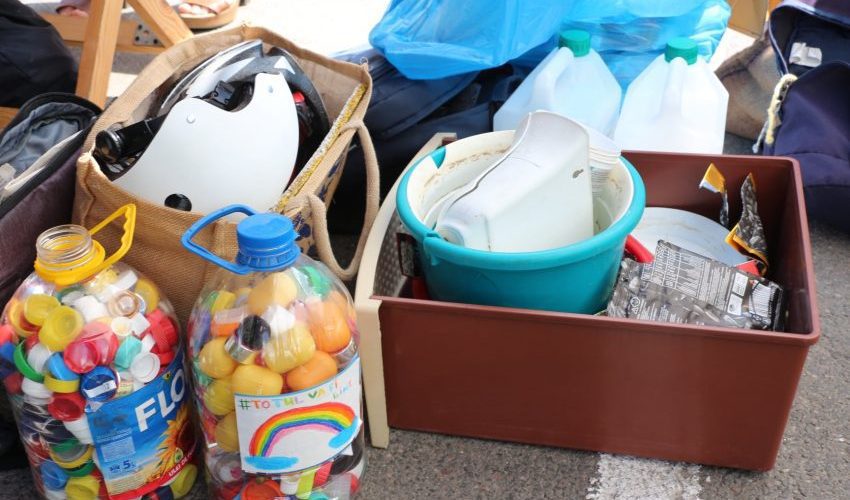The month of July is dedicated worldwide to the problem of plastic pollution of the environment. "Plastic Free July" means accepting the fact that plastic is one of the biggest enemies of our planet, and its use will lead to very serious consequences for future generations. "Plastic-free July" is the movement of conscious people, ready to say STOP to pollution, who seek, find and implement solutions to stop plastic pollution.
On the first day of July, I asked the passers-by in the Public Garden "Ștefan cel Mare si Sfânt" in the municipality of Chisinau, what they think about the use of plastic and how they see the reduction of waste.
Ion, the locality of Orhei: "In July, but also throughout the summer, people hydrate more intensively, using plastic bottles excessively. Let's not forget the picnic season, where most of the cutlery and crockery is made of plastic or, at best, paper, which unfortunately are left in the places where such activities took place. Unfortunately, people are still not environmentally educated and use plastic items frequently or thoughtlessly: cream tubes, water bottles, cutlery, etc. As a solution I would propose: the definitive ban on the packaging of fruits and vegetables in plastic packaging; correct information and promotion of eco-thinking, use of personal ecological glass; promoting eco culture".
Arina, Selemet town: "In my opinion, July is the month when most citizens of the Republic of Moldova are away on vacation abroad or with relatives, so during this period, as a result of human activity, there is less waste. But this is not reflected at the global level, because during this period people are surrounded by a lot of fun activities, which entices them to buy new products or get caught in the web of fast fashion. I propose the implementation of degradable clothes in a short period of time. This would reduce the amount of non-recycled fabric. I also suggest using upgradeable phones. This would facilitate the continued use of a device and reduce the amount of e-waste."
Oleg, Chisinau municipality: "The separation of waste is very important, I personally separate the waste as much as possible, at least the vegetable ones, and already when I throw the waste at the dumpsters next to the block, I separate them, plastic, paper, glass. As suggestions for the population, it would be that each individual should be his own example of self-education; to emphasize a means of transport that is not harmful to the environment, such as a bicycle, a scooter or walking, an electric car; everyone should separate the waste in their own home".
Alexandrina, Holercani locality: "I know a team from Chisinau that specializes in plastic, Young people for EcoPlastic which deals with the collection of plastic caps, which are later melted and make different objects from them. At Holercani I participated in a training organized by them. To be more environmentally friendly, I try to buy a water bottle and reuse it; I only buy eco bags; if possible I walk as much as possible, but to get from one destination to another, I use public transport. A solution would be more information - it would help the population to get rid of the waste problem; as many waste collection and separation points as possible, because they are less common in villages".
Petru, Cimișlia township: "To combat the problem of environmental pollution, we need to work with the population, organize informative sessions - experts should come up with different practical methods, for example the leaves that are often burned in autumn, explain that they can be composted and used as fertilizers for ground To talk to them about the consequences that their waste causes in nature, because of which we also suffer. Everything must start from kindergartens, schools, so that the young generation takes over these practices".
Jonathan, Romania: "Waste separation is civilization, waste is a global problem, it affects the soil, air, waters, oceans and we humans are affected by it. As a solution to stop waste, I would propose that the idea of a fine be adopted, if you throw in unauthorized areas - a fine, it will be like a lesson, next time not to throw. Another solution would be for public transport to be electric; the use of biodegradable bags or ecological bags".
A third of the people approached in the "Ștefan cel Mare si Sfânt" Public Garden refused to discuss this topic.
The "Plastic Free July" movement was initiated in 2010 by an Australian environmental organization. Now in its 11th edition, it sets out a vision for cleaner streets, oceans and communities. Every year more and more people have joined this initiative, so far more than 250 million people from 177 countries have participated.
Ludmila Hițuc
The Association of Environmental Journalists and Ecological Tourism is a beneficiary of the Local Grants Program of the European Union (EU) and implements the "With attitude for a healthy environment" project at the national level.
The Local Grants Program is launched based on the Single Support Framework of the EU, granted for the Republic of Moldova (2017-2020) within the European Neighborhood Instrument, through the project "Empowering the citizens of the Republic of Moldova" (2019-2021), financed by European Union and implemented by the German International Cooperation Agency (GIZ). The project partner for increasing the potential for visibility and citizen involvement is the Independent Press Association (API).

